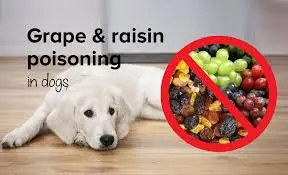Can a Dog Eat Raisins? A Comprehensive Guide About Risks and Dangers
As pet owners, we often find ourselves wondering about the safety of various foods we enjoy. One common question is, “Can a dog eat raisins?” While many people may consider raisins a healthy snack for humans, they pose significant health risks for dogs. This article explores the dangers of feeding raisins to dogs, the symptoms of raisin toxicity, and what to do if your dog accidentally consumes them.

The Risks of Feeding Raisins to Dogs
Raisins, which are dried grapes, can be extremely toxic to dogs. The exact substance in raisins that causes toxicity remains unknown, but even small amounts can lead to severe health issues, including kidney failure. This toxicity can occur in dogs of all sizes, breeds, and ages, making it a serious concern for dog owners.
Why Are Raisins Toxic to Dogs?
The specific reason why raisins are harmful to dogs is still under investigation. Some theories suggest that a substance in grapes and raisins may cause acute kidney injury in susceptible dogs. Interestingly, not all dogs seem to react the same way; some dogs can consume raisins without visible effects, while others can experience severe toxicity from just a few.
Symptoms of Raisin Toxicity
If you suspect your dog has eaten raisins, it’s vital to watch for any symptoms of toxicity. Signs may not appear immediately and can develop within hours or up to a few days after ingestion. Common symptoms of raisin toxicity in dogs include:
- Vomiting: This is often one of the first signs that something is wrong. If your dog vomits within a few hours of eating raisins, it may be an indication of toxicity.
- Diarrhea: Loose stools or diarrhea can also occur, sometimes accompanied by blood.
- Loss of Appetite: A dog may refuse to eat, displaying disinterest in food and treats.
- Lethargy: If your dog seems unusually tired or less active, it could be a sign of distress.
- Abdominal Pain: You may notice your dog whining or showing signs of discomfort when you touch its abdomen.
- Increased Thirst and Urination: As kidney function deteriorates, your dog may drink more water and urinate frequently, followed by a decrease in urine output.
- Signs of Kidney Failure: In severe cases, dogs may develop symptoms like bad breath (which may smell like urine), confusion, and seizures.
What to Do If Your Dog Eats Raisins
If your dog has consumed raisins, it’s essential to act quickly. Here are the steps to take:
- Call Your Veterinarian: Reach out to your vet immediately, even if your dog shows no symptoms. Provide them with details about how many raisins your dog may have eaten and when.
- Induce Vomiting: Depending on the situation and the veterinarian’s advice, they may recommend inducing vomiting to prevent the absorption of toxins. This should only be done under professional guidance.
- Monitor Symptoms: Keep a close eye on your dog for any signs of distress or illness. If symptoms develop, take your dog to the veterinarian right away.
- Supportive Care: If your dog shows signs of kidney failure, your veterinarian may recommend hospitalization for supportive care, which may include intravenous fluids and medications to help manage symptoms and support kidney function.
How to Prevent Raisin Toxicity
The best way to protect your dog from raisin toxicity is prevention. Here are some tips to keep your dog safe:
- Avoid Feeding Raisins: Do not intentionally feed your dog raisins or foods containing raisins, such as baked goods or trail mixes.
- Educate Family and Friends: Make sure everyone in your household understands the dangers of raisins for dogs. Inform visitors and pet sitters as well.
- Keep Foods Out of Reach: Store all foods, especially those containing raisins or grapes, in secure cabinets or on high shelves where your dog cannot access them.
- Choose Safe Treats: If you’re looking for healthy snacks for your dog, opt for dog-safe fruits and vegetables like carrots, apples (without seeds), or blueberries.
The Importance of Education
Understanding the risks associated with feeding dogs certain human foods is crucial for every pet owner. Raisins may seem harmless, but their potential to cause serious health issues makes them a food that should be avoided at all costs. Education about food safety for pets can save lives and prevent emergencies.
Alternatives to Raisins for Dog Treats
If you’re looking for healthy treat alternatives, there are many options that are safe for dogs. Some popular choices include:
- Carrots: Crunchy, low-calorie, and high in fiber, carrots are a great option for dogs.
- Blueberries: These antioxidant-rich berries are a tasty and nutritious treat.
- Peanut Butter: Most dogs love peanut butter, but ensure it’s xylitol-free, as xylitol is toxic to dogs.
- Pumpkin: Plain canned pumpkin (not the spiced pie filling) is a great source of fiber and can help with digestion.
- Sweet Potatoes: Cooked and mashed sweet potatoes are a healthy treat rich in vitamins.
Conclusion
In conclusion, dogs should never eat raisins due to the risk of toxicity and potential kidney failure. Even small amounts can lead to severe health consequences, so it’s crucial to be vigilant and proactive in keeping raisins and other harmful foods out of your dog’s reach. If your dog accidentally consumes raisins, contact your veterinarian immediately for guidance and support.
By educating yourself and others about the dangers of raisins for dogs and providing safe alternatives, you can help ensure the health and safety of your beloved pet. Remember, when it comes to your dog’s diet, it’s always better to be safe than sorry!
